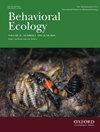Explaining variation in the kinship composition of mammal groups
IF 2.2
3区 环境科学与生态学
Q2 BEHAVIORAL SCIENCES
引用次数: 0
Abstract
Variation in cooperative behaviour across mammals is strongly related to the kinship composition of groups. Although the factors affecting average genetic relatedness within groups have been studied, the factors that contribute to the production of different categories of kin remain underexplored. Here, I use a mathematical model to explore the factors that determine the proportion of full siblings, maternal half-siblings, paternal half-siblings, and non-siblings within mammal groups. The results suggest that the production of paternal half-siblings is increased by high male reproductive skew and a female-biased sex ratio, the production of maternal half-siblings is increased by high female reproductive skew and male-biased sex ratio, and that there are two routes to the production of full siblings: either high reproductive skew in both sexes (as seen in cooperatively breeding species) or pair-bond stability within groups of low reproductive skew (as seen in humans). These results broadly correspond to observed variation in sibling composition across mammals.解释哺乳动物群体亲缘关系构成的变化
哺乳动物合作行为的差异与群体的亲缘关系组成密切相关。尽管已经对影响群体内平均遗传亲缘关系的因素进行了研究,但对产生不同类别亲属关系的因素仍然缺乏探索。在这里,我使用一个数学模型来探讨决定哺乳动物群体内全系同胞、母系同父异母兄弟姐妹、父系同母异父兄弟姐妹和非同胞兄弟姐妹比例的因素。结果表明,高雄性生殖偏斜和雌性偏向的性别比会增加父系半同胞的产生,高雌性生殖偏斜和雄性偏向的性别比会增加母系半同胞的产生,而产生全同胞有两种途径:一种是高雌雄生殖偏斜(见于合作繁殖的物种),另一种是低生殖偏斜群体中的配对结合稳定性(见于人类)。这些结果与在哺乳动物中观察到的兄弟姐妹组成的变化基本一致。
本文章由计算机程序翻译,如有差异,请以英文原文为准。
求助全文
约1分钟内获得全文
求助全文
来源期刊

Behavioral Ecology
环境科学-动物学
CiteScore
5.20
自引率
8.30%
发文量
93
审稿时长
3.0 months
期刊介绍:
Studies on the whole range of behaving organisms, including plants, invertebrates, vertebrates, and humans, are included.
Behavioral Ecology construes the field in its broadest sense to include 1) the use of ecological and evolutionary processes to explain the occurrence and adaptive significance of behavior patterns; 2) the use of behavioral processes to predict ecological patterns, and 3) empirical, comparative analyses relating behavior to the environment in which it occurs.
 求助内容:
求助内容: 应助结果提醒方式:
应助结果提醒方式:


